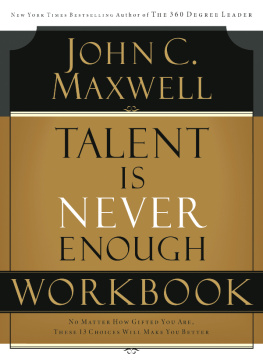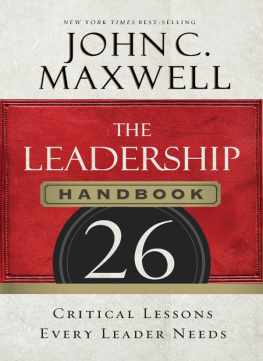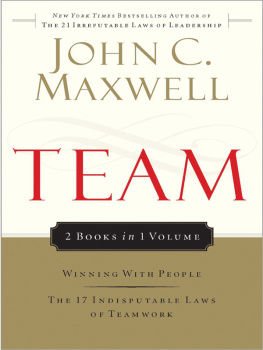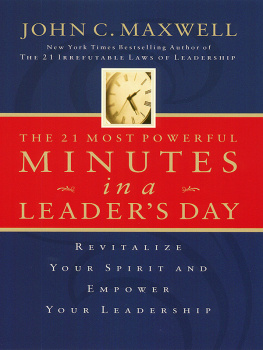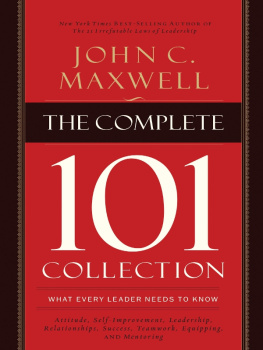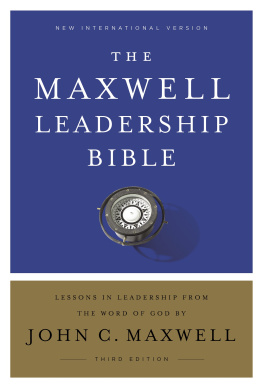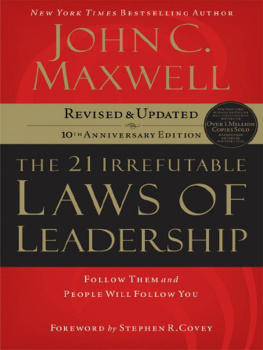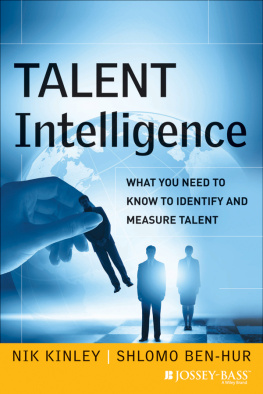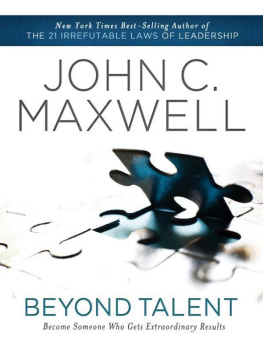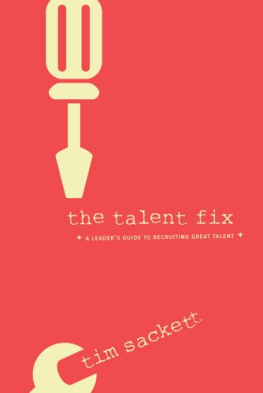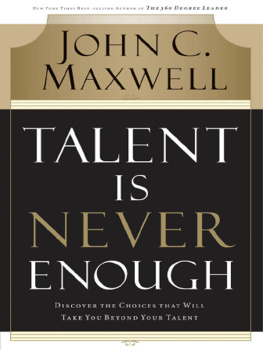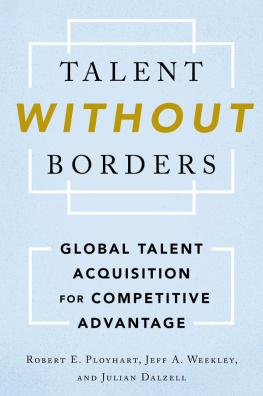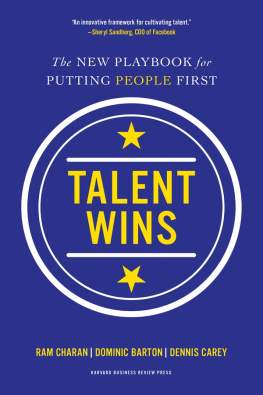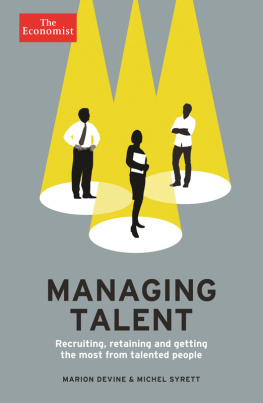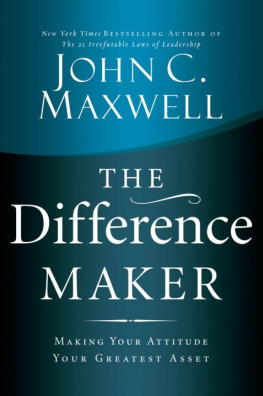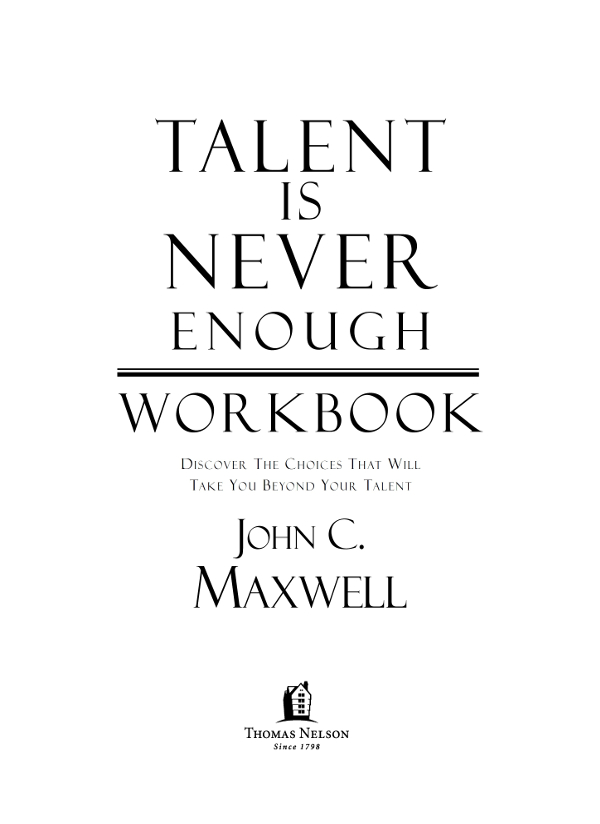In this ebook edition, please use your devices note-taking function to record your thoughts wherever you see the bracketed instructions [Your Notes] or [Your Response Here]. Use your devices highlighting function to record your response whenever you are asked to checkmark, circle, underline, or otherwise indicate your answer(s).
I NTRODUCTION
W HEN I S T ALENT
A LONE E NOUGH ?
T alent is often overrated and frequently misunderstood. French poet and dramatist Edouard Pailleron pointed out, Have success and there will always be fools to say that you have talent. When people achieve great things, others often explain their accomplishments by simply attributing everything to talent. But that is a false and misleading way of looking at success. If talent alone is enough, then why do you and I know highly talented people who are not highly successful?
Many American business leaders are obsessed with talent. Some think talent is the answer to every problem. Malcolm Gladwell, author of The Tipping Point and Blink, notes that many companies and consultants put finding people with talent ahead of everything else. He says, This talent mind-set is the new orthodoxy of American management. Certain companies hire dozens of MBAs from top universities, promote them quickly, reward them lavishly, and never accurately assess their performance. The prime example he gives is Enron. Its talent focus was legendary. For example, Lynda Clemmons, who started Enrons weather derivatives business, went from trader to associate to manager to director to head of her own business unit in only seven years! Gladwell asks, How do you evaluate someones performance in a system where no one is in a job long enough to allow such evaluation? Talent is never enough. Peter Drucker, the father of modern management, said, There seems to be little correlation between a mans effectiveness and his intelligence, his imagination, or his knowledge... Intelligence, imagination, and knowledge are essential resources, but only effectiveness converts them into results. By themselves, they only set limits to what can be contained. If talent were enough, then the most effective and influential people would always be the most talented ones. But that is often not the case. Consider this:
More than 50 percent of all CEOs of Fortune 500 companies had C or C- averages in college.
Sixty-five percent of all U.S. senators came from the bottom half of their school classes.
Seventy-five percent of U.S. presidents were in the Lower-Half Club in school.
More than 50 percent of millionaire entrepreneurs never finished college! Clearly talent isnt everything.
Define talent.
[Your Response Here]
Describe the circumstances surrounding the success of some people in your organization.How did their talents help them succeed? What other factors aided in their success?
[Your Response Here]
Give an example of someone who has a wealth of talent but has not become successful.What has held this person back from achieving his or her goals?
[Your Response Here]
T HE H IGH -J UMP P RINCIPLE
This is not an anti-talent book. I believe in the importance of talent. How could I not? All successful leaders understand its importance. Legendary college football coach Lou Holtz once told me, John, Ive coached teams with good players and Ive coached teams with bad players. Im a better coach when I have good players! The more talent that a sports, business, or service team possesses, the greater potential it hasand the better its leader can be.
A wonderful, simple illustration of the importance of talent can be seen in a sports event like the high jump. Winning the high jump requires one person who can jump seven feet, not seven people who can jump one foot. Such an example may seem obvious, yet dont we often believe that we can accomplish more by throwing more people at a task? That isnt always the right solution. In fact, there are many tasks that call for talent more than numbers. Like high jumping, they require the extraordinary talent of one person, not the mediocre talent of many.
P UTTING T ALENT INTO P ERSPECTIVE
As I said, I dont mean to minimize the importance of talent. Talent is a God-given gift that should be celebrated. When we observe talented people we should marvel at their giftedness and recognize their contribution to society; however, we should also be able to separate what they can do from who they are.
Fred Smith, author and former president of Fred Smith Associates, shared a bit of wisdom with me many years ago. He said, The giftedness is usually greater than the person. By that he meant that the talent of some people is greater than other important personal attributes, such as character and commitment. As a result, they often fail to rise to the level of their talent. Talented people are always tempted to coast on their abilities. Or they want others to recognize their skills but overlook their deficiencies.
What talents are you often recognized for?
[Your Response Here]
Give an example of a time you were able to coast on your talent. What was the outcome?
[Your Response Here]
So is talent ever enough? Yes, but only in the very beginning. Novelist Charles Wilson says, No matter the size of the bottle, the cream always rises to the top. Talent stands out. It gets you noticed. In the beginning, talent separates you from the rest of the pack. It gives you a head start on others. For that reason, natural talent is one of lifes greatest gifts. But the advantage it gives lasts only a short time. Songwriter Irving Berlin understood this truth when he said, The toughest thing about success is that youve got to keep on being a success. Talent is only a starting point in business. Youve got to keep working that talent.
What are you currently doing to develop your talents?
[Your Response Here]
Too many talented people who start with an advantage over others lose that advantage because they rest on their talent instead of raising it. They assume that talent alone will keep them out front. They dont realize the truth: if they merely wing it, others will soon fly past them. Talent is more common than they think. Mega-best-selling author Stephen King asserts that talent is cheaper than table salt. What separates the talented individual from the successful one is a lot of hard work. Clearly more than just talent is needed for anyone who wants to achieve success.

